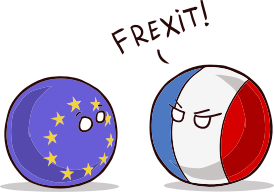 |
| The upcoming French presidential election, |
what you need to know and how it may affect
the euro and European markets. |
 |
|
| When |
| The first round of the French presidential election takes place this Sunday, April 23rd, the second and final round two weeks later, on May 7th. Although technically a candidate could win by securing 50% of the vote in the first round of voting, this is highly unlikely and hasn’t happened since the modern version of the French election process was introduced back in the 1960’s. |
 |
|
| Candidates |
| There are five prospective presidents, but (arguably) only four with a reasonable chance of victory. Two finalists will then fight it out on May 7th, once three are eliminated after the first round of voting. Thereafter, the French vote again on June 11th and 18th to elect the National Assembly; 557 constituencies throughout France pick a representative deputy, to sit in what’s regarded as France’s Parliament, the equivalent would be the UK’s House of Commons and the USA Congress. |
 |
| Recent French presidential elections have been fought by predominantly centrist, or slightly left or right of centre politicians and parties, particularly after the first round of votes are counted. Historically, these have been candidates fighting over the middle class and middle ground votes, by promising micro adjustments in French society and the economy. However, this time the presidential race is radically different and in this short communique we’ll explain what to look out for, specifically in terms of the impact the election may have on the euro. |
| The emergence of two radical candidates, both at opposite ends of the political spectrum, who have become serious candidates and possible presidents, has (at times) sent the main French equity market (the CAC), wider European markets and the euro into a tailspin. Both radical candidates; Marine Le Pen of the (hard) right wing National Front party and Jean-Luc Mélenchon the leader of the (hard) left wing France Untamed, have both intimated that should they become president, they’d then begin to put in place the mechanism for France to potentially exit the Eurozone, abandon the euro and revert back to the franc currency. |
|
 |
| As the first round of voting approaches, this Sunday on April 23rd, their visions are being taken seriously, given that both candidates are now polling at circa 20% levels, with Mélenchon enjoying a late surge; from single digit support and low teens less than two weeks back. |
| Frexit |
| Neither candidate would immediately withdraw France from Europe by means of what’s being termed Frexit, similar to the UK’s Brexit it would possibly require a referendum, government permission and a vote in France’s parliament. Indeed both are threatening reforms, as opposed to an exit strategy. However, it’s the exit possibility that’s caused a recent lack of confidence in France’s economy and as a consequence France’s main CAC equity market and more specifically the euro, which has sold off sharply when increased polling for the two supposedly more extreme candidates has emerged. France is absolutely crucial to the survival of the euro and pivotal to the continuation of the Eurozone, both as a trading zone and a social construct. |
 |
| Whilst we’ve concentrated on the two candidates at the end of the spectrum there’s also two other centrist political party leaders who may emerge as the two finalists on Sunday, Francois Fillon of the Republican Party and Emmanuel Macron of Forward. Current polling, according to the Financial Times reports on April 18th, has Marine Le Pen and Macron both tied at 23%, with Fillon and Mélenchon tied on 19%. |
|
| Throughout the rest of this week as polling continues and possibly tightens, we may experience sudden and consistent movements in the value of euro versus its main peers. Similarly the CAC and the value of other European markets may fluctuate, therefore traders should remain vigilant regarding the value of euro over the coming trading days. However, it’s as markets open on Sunday, after the result is announced at 7pm London time, 8pm European time, which represents the most volatile period. FX markets often ‘gap’ up or down on Sunday evening Monday morning as the markets open, this gapping could be accentuated depending on the first round result. |
| Naturally the volatility in the euro will be determined by who wins through to the second round, markets traditionally react badly to insecurity; investors traditionally shun the ideologies of radical politicians at the sharp ends of the political spectrum. The opening of the FX markets and equity futures markets on Sunday evening, could provide one of the most explosive openings witnessed since previous political and economic crises gripped the markets. |
|
|